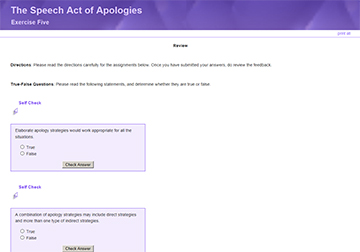Unit 5: Combinations of Apology Strategies
In some situations, it would be appropriate to use a mere 对不起 to apologize in Chinese; while in some scenarios, there may be a need to use elaborate strategies, that is, the combinations of different apology strategies. This unit provides students with a variety of combinations of apology strategies and corresponding situational descriptions to help them gain a better understanding of how to apologize in Chinese.
5.1 Goal of Unit 5
The goal of Unit 5 is to familiarize students with different combinations of apology strategies in Chinese. After studying this unit, students are expected to be able to correctly code apologetic expressions into combinations of strategies (i.e., formulas).
5.2 Combinations of Apology Strategies (1)
As we discussed in Units 3 and 4, direct strategies are often combined with indirect strategies to intensify the force of apologizing in Chinese. Sometimes a combination may include more than one direct apologetic formulas and more than one type of indirect strategies, depending on specific situations and interlocutors. Below are some examples adapted from Zhang (2012) to illustrate the use of strategy combinations in Chinese apologies.
(1) Direct +Direct
Xiaobai is a new staff in a company. He apologized to his boss for having failed to fulfil his duty, which brought about inconvenience to the company.
我非常抱歉……我向您道歉。Wǒ fēicháng bàoqiàn…wǒ xiàng nín dàoqiàn.
(I’m very sorry…I apologize to you.)
Considering this is a relatively formal situation (between subordinate and boss) and the severity of the offence, Xiaobai chose to apologize to his boss using two types of direct formulaic expressions. So the apologetic expressions are coded as “Direct + Direct.”
(2) Direct + Explanation
Wang Peng was late for an appointment with his friends. When he arrived, he apologized to the people,
不好意思,我有事来晚了。Bùhǎoyìsi, wǒ yǒu shì lái wǎnle. (I’m sorry. I’m late.)
Wang Peng apologized to his friends using the combination of a direct apologetic expression and one type of indirect apology strategy (i.e., explanations for being late), which is acceptable and appropriate for this situation.
(3)Direct + Concern for Hearers
Wang Peng knocked into a stranger on the road, and apologized,
对不起,你没事吧?Duìbùqǐ, nǐ méi shì ba? (I’m sorry. Are you alright?)
Wang Peng accidentally bumped into the stranger and thus explicitly apologized to him. In addition, Wang Peng showed his concern for the stranger to strengthen the force of apologizing. And the apologetic expressions are coded as “Direct + Concern for hearers.”
5.3 Combinations of Apology Strategies (2)
More examples that illustrate the use of apology strategy combinations in Chinese are provided below.
(1) Direct + Promise of forbearance
Wang Peng and Li You made an appointment to travel to Beijing together, but he could not make it now. So Wang Peng apologized to Li You,
不好意思,Li You, 我下次一定陪你去。Bùhǎoyìsi, Li You, wǒ xiàcì yídìng péi nǐ qù.
(I’m sorry, Li You. I will surely go with you next time.)
In this situation, Wang Peng broke his promise to his friend. So he directly apologized to Li You for his forgiveness, and then used the strategy of promise of forbearance to placate his friend.
(2) Direct + Explanation + Offer of repair
Wang Peng did not pay his apartment rent on time and apologized to the landlord,
真是很对不起,最近太忙了,明天我就把房租给你。
Zhēn shì hěn duìbùqǐ, zuìjìn tài máng le, míngtiān wǒ jiù bǎ fángzū gěi nǐ.
(I’m really sorry. I am quite busy recently. I will give you the rent tomorrow.)
Not paying the apartment rent on time seems a relatively severe offence, so Wang Peng used more elaborate strategies to apologize to the landlord. He first used a direct apology formula intensified by 真是 and 很, followed by the offer of reasonable excuses and a good way of repair.
Thinking: How do American speakers use combinations of different strategies to apologize in everyday communication? Any examples?
To learn more about the Chinese words and expressions in this section, please refer to the Glossary below.
| Word | Pinyin | Part of speech | English translations |
| 下次 | xiàcì | adv. | Next time |
| 一定 | yídìng | adv. | Surely; certainly |
| 陪 | péi | verb | To accompany |
| 去 | qù | verb | To go |
| 最近 | zuìjìn | adv. | Recently |
| 忙 | máng | adj. | Busy |
| 明天 | míngtiān | adv. | Tomorrow |
| 就 | jiù | adv. | As soon as; right after |
| 房租 | fángzū | noun | Rent |
| 给 | gěi | verb | To give |
Review
To review the main ideas in this section, please click on the Review link.
